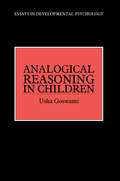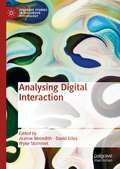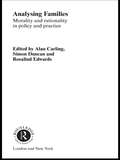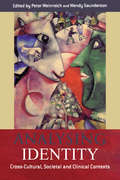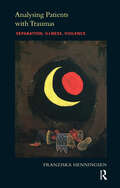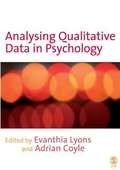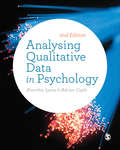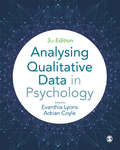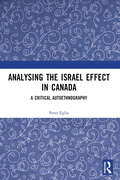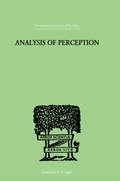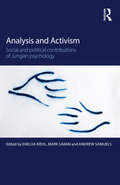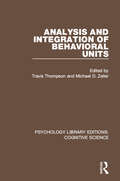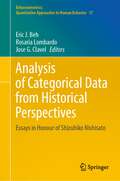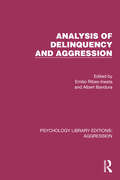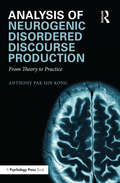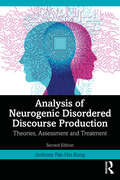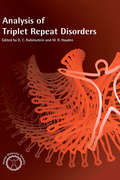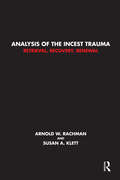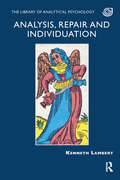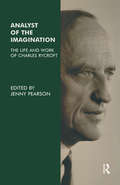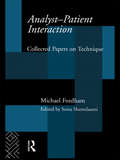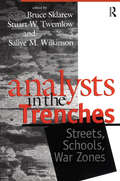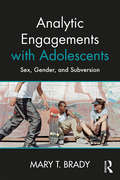- Table View
- List View
Analogical Reasoning in Children (Essays in Developmental Psychology)
by Usha GoswamiAnalogical reasoning is a fundamental cognitive skill, involved in classification, learning, problem-solving and creative thinking, and should be a basic building block of cognitive development. However, for a long time researchers have believed that children are incapable of reasoning by analogy. This book argues that this is far from the case, and that analogical reasoning may be available very early in development. Recent research has shown that even 3-year-olds can solve analogies, and that infants can reason about relational similarity, which is the hallmark of analogy.The book traces the roots of the popular misconceptions about children's analogical abilities and argues that when children fail to use analogies, it is because they do not understand the relations underlying the analogy rather than because they are incapable of analogical reasoning. The author argues that young children spontaneously use analogies in learning, and that their analogies can sometimes lead them into misconceptions. In the "real worlds" of their classrooms, children use analogies when learning basic skills like reading, and even babies seem to use analogies to learn about the world around them.
Analysing Digital Interaction (Palgrave Studies in Discursive Psychology)
by David Giles Joanne Meredith Wyke StommelThis book investigates interaction-focused scholarship on online communication. It focuses on a broad range of online contexts including social media, dating apps, online comments, instant messaging and video-mediated interaction. Bringing together experts from a variety of scholarly backgrounds, chapters demonstrate how different microanalytic methods, including conversation analysis, membership categorization analysis and discursive psychology, can be applied to online communication. The book also goes on to address ethical, methodological and theoretical issues of analysing online social interaction. With the explosion of the use of online platforms for everyday and institutional interaction, this book is a timely collection which explores the current state of the field, and considers future directions for microanalysis of online communication.
Analysing Families: Morality and Rationality in Policy and Practice
by Rosalind Edwards Alan Carling Simon DuncanWhile the family and its role continues to be a key topic in social and government policy, much of the literature is concerned with describing the dramatic changes that are taking place. By contrast, Analysing Families directly addresses the social processes responsible for these changes - how social policy interacts with what families actually do. Topics covered include:* the relationship between morality and rationality in the family context* the variety of contemporary family forms* the purposes and assumptions of government interventions in family life* the relationship between different welfare states and different ideas about motherhood* 'Third Way' thinking on families* divorce and post-divorce arrangements* lone parenthood and step-parenting* the decision to have children* the economic approach to understanding family process* the legitimacy of state intervention in family life.With contributions from the UK, and North America, Analysing Families provides the framework within which to understand an increasingly important element in social policy.
Analysing Identity: Cross-Cultural, Societal and Clinical Contexts
by Peter Weinreich Wendy SaundersonPeople's identities are addressed and brought into being by interaction with others. Identity processes encompass biographical experiences, historical eras and cultural norms in which the self's autonomy varies according to the flux of power relationships with others. Identity Structure Analysis (ISA) draws upon psychological, sociological and social anthropological theory and evidence to formulate a system of concepts that help explain the notion of identity. They can be applied to the practical investigations of identity structure and identity development in a number of clinical, societal and cultural settings. This book includes topics on national and ethnic identification in multicultural contexts and gender identity relating to social context and the urban environment. Clinical applications that describe identity processes associated with psychological distress are also examined. These include anorexia nervosa and vicarious traumatisation of counsellors in the aftermath of atrocity. Analysing Identity is unique in its development of this integrative conceptualisation of self and identity, and its operationalisation in practice. This innovative book will appeal to academics and professionals in developmental, social, cross-cultural, clinical and educational psychology and psychotherapy. It will also be of interest to those involved with sociology, political science, gender studies, ethnic studies and social policy. Of particular note is the availability of new software, Ipseus, which facilitates ISA for use by practitioners. It enables them to enhance their professional skills by ascertaining their clients’ perspectives on self as located in the social world. This has been successfully used with pre-school three to five year-old children, and all other age-ranges through childhood, adolescence and adulthood. Ipseus is designed to be used in inter-cultural contexts and appeals to practitioners for their input for the generation of customized identity instruments (see www.identityexploration.com).
Analysing Patients with Traumas: Separation, Illness, Violence
by Franziska HenningsenThe focus of this book is on detailed case histories of patients with severe traumas. The author takes us through the successive stages of analysis and gives us a graphic impression of the progress of her diagnostic and therapeutic insights into traumatic processes and their treatment. Her main interest is in the development of the transference/countertransference relationship. Traumatic experience has to be actualised within that relationship if it is to be treated successfully, only in this way can therapeutic change become a feasible proposition. Traumatic micro-processes and trauma-sequel phenomena in transference and countertransference are described and conceptualized. The author demonstrates her point with examples taken from clinical practice: illnesses experienced as traumatic; separation traumas; childhood experiences of violence; adult experiences of violence: war, torture, and displacement that can engender PTSD. This book is a genuinely original contribution to psychoanalytic treatment of traumas.
Analysing Qualitative Data in Psychology
by Dr Evanthia Lyons Adrian CoyleAnalysing Qualitative Data in Psychology equips students and researchers in psychology and the social sciences to carry out qualitative data analysis, focusing on four major methods (grounded theory, interpretative phenomenological analysis, discourse analysis and narrative analysis). Assuming no prior knowledge of qualitative research, chapters on the nature, assumptions and practicalities of each method are written by acknowledged experts. To help students and researchers make informed methodological choices about their own research the book addresses data collection and the writing up of research using each method, while providing a sustained comparison of the four methods, backed up with authoritative analyses using the different methods.
Analysing Qualitative Data in Psychology
by Adrian Coyle Evanthia LyonsInstructors - Electronic inspection copies are available or contact your local sales representative for an inspection copy of the print version. Analysing Qualitative Data in Psychology is a clear, step-by–step guide linking theory with practice, that offers a unique combination of perspectives on five qualitative approaches: grounded theory, interpretative phenomenological analysis, discourse analysis, narrative analysis and thematic analysis that can be applied to a common data set. This text provides practical advice and guidance from experts as well as a comparison of the different methods, which will help students decide the approach that’s right for them and their research project. The second edition of this text: Introduces a fifth, additional qualitative approach, Thematic Analysis Explores the ethical challenges of qualitative work Takes a look at mixed methods and pluralist research Includes worked-out examples of qualitative analyses and brand new tools for learning, including ‘road maps’ for qualitative analysis Analysing Qualitative Data in Psychology, Second Edition is the perfect text for psychology students engaged in qualitative research or studying research methods, at either undergraduate or postgraduate level.
Analysing Qualitative Data in Psychology
by Adrian Coyle Evanthia LyonsInstructors - Electronic inspection copies are available or contact your local sales representative for an inspection copy of the print version. Analysing Qualitative Data in Psychology is a clear, step-by-step guide linking theory with practice, that offers a unique combination of perspectives on five qualitative approaches: grounded theory, interpretative phenomenological analysis, discourse analysis, narrative analysis and thematic analysis that can be applied to a common data set. This text provides practical advice and guidance from experts as well as a comparison of the different methods, which will help students decide the approach that's right for them and their research project. The second edition of this text: Introduces a fifth, additional qualitative approach, Thematic Analysis Explores the ethical challenges of qualitative work Takes a look at mixed methods and pluralist research Includes worked-out examples of qualitative analyses and brand new tools for learning, including 'road maps' for qualitative analysis Analysing Qualitative Data in Psychology, Second Edition is the perfect text for psychology students engaged in qualitative research or studying research methods, at either undergraduate or postgraduate level.
Analysing Qualitative Data in Psychology
by Adrian Coyle Evanthia LyonsLooking for a practical, comprehensive overview of Qualitative Research Methods? Want to know the best approach to take for you and your research project? This book takes you through five different qualitative approaches – thematic analysis, interpretative phenomenological analysis, grounded theory, narrative analysis and discourse analysis. Applying them all to a common data set, this book gives you step-by-step guidance on each approach and helps you work out which is the right one for you. Plus, with a whole new part on qualitative data collection – including chapters on interviewing, social media data and visual methodologies – this new edition is the ultimate resource for students engaged in qualitative psychological research or studying methods at any level.
Analysing Qualitative Data in Psychology
by Adrian Coyle Evanthia LyonsLooking for a practical, comprehensive overview of Qualitative Research Methods? Want to know the best approach to take for you and your research project? This book takes you through five different qualitative approaches – thematic analysis, interpretative phenomenological analysis, grounded theory, narrative analysis and discourse analysis. Applying them all to a common data set, this book gives you step-by-step guidance on each approach and helps you work out which is the right one for you. Plus, with a whole new part on qualitative data collection – including chapters on interviewing, social media data and visual methodologies – this new edition is the ultimate resource for students engaged in qualitative psychological research or studying methods at any level.
Analysing the Israel Effect in Canada: A Critical AutoEthnography
by Peter EglinWhat is the life of a Palestinian worth to intellectuals in Canadian universities and news media? Analyzing the Israel Effect documents and analyzes the discursive and organizational methods by which public criticism of Israel’s oppression of the Palestinians is silenced in Canada, as experienced through ten episodes in the life of the author over a thirty-year period from 1990-2020 in interaction with his university and local and national Canadian news media.As a sociological work the book is a critical autoethnography. But it is also an atrocity tale, a horror story of institutional self-censorship amounting to the abrogation of intellectual responsibility by those specifically charged with upholding it. In the end, the book is a crossover between academic treatise and journalistic exposé, “a historical narrative written by an academic from the standpoint of a political participant-observer” (Rajan Philips). The Israel Effect itself is analyzed as a three-tier propaganda industry. Hasbara is produced in Israel (Tier 1), disseminated to Israel Lobby groups around the world (Tier 2) and independently re-produced, actively and passively, by the “intellectual” institutions – universities and news media (Tier 3). This book is about the non-Jewish, non-Zionist institutions of Tier 3, the onlookers to war crimes, ethnic cleansing and, arguably, genocide, as in Gaza in October-November 2023.This work stands as a compelling testament to the importance of preserving freedom of expression, and the vital role intellectuals play in challenging injustice and promoting transparency. It is ideal for scholars, activists, and anyone seeking to understand the complexities of political activism and the power dynamics behind public discourse.
Analysis Of Perception (International Library Of Psychology Ser.)
by Smythies, J RFirst published in 1999. Routledge is an imprint of Taylor & Francis, an informa company.
Analysis and Activism: Social and Political Contributions of Jungian Psychology
by Andrew Samuels Emilija Kiehl Mark SabanJungian psychology has taken a noticeable political turn in the recent years, and analysts and academics whose work draws on Jung’s ideas have made internationally recognised contributions in many humanitarian, communal and political contexts. This book brings together a multidisciplinary and international selection of contributors, all of whom have track records as activists, to discuss some of the most compelling issues in contemporary politics. Analysis and Activism is presented in six parts: Section One, Interventions, includes discussion of what working outside the consulting room means, and descriptions of work with displaced children in Colombia, projects for migrants in Italy and of an analyst’s engagement in the struggles of indigenous Australians. Section Two, Equalities and Inequalities, tackles topics ranging from the collapse of care systems in the UK to working with victims of torture. Section Three, Politics and Modernity, looks at the struggles of native people in Guatemala and Canada and oral history interviews with members of the Chinese/Vietnamese diaspora. Section Four, Culture and Identity, studies issues of race and class in Brazil, feminism and the gendered imagination, and the introduction of Obamacare in the USA. Section Five, Cultural Phantoms, examines the continuing trauma of the Cultural Revolution in China, Jung’s relationship with Jews and Judaism, and German-Jewish dynamics. Finally, Section Six, Nature: Truth and Reconciliation, looks at our broken connection to nature, town and country planning, and relief work after the 2011 earthquake in Japan. There remains throughout the book an acknowledgement that the project of thinking forward the political in Jungian psychology can be problematic, given Jung’s own questionable political history. What emerges is a radical and progressive Jungian approach to politics informed by the spirit of the times as well as by the spirit of the depths. This cutting-edge collection will be essential reading for Jungian and post-Jungian academics and analysts, psychotherapists, counsellors and psychologists, and academics and students of politics, sociology, psychosocial studies and cultural studies.
Analysis and Integration of Behavioral Units (Psychology Library Editions: Cognitive Science #25)
by TRAVIS THOMPSON AND MICHAEL D. ZEILEROriginally published in 1986, this volume was the result of a conference in honor of the 65th birthday of the late Kenneth MacCorquodale, an exceptionally eloquent spokesman for the field of experimental analysis of behaviour at the time. The present volume grew directly out of the issues raised by MacCorquodale and Meehl in their "Excursis: The Response Concept" paper and which MacCorquodale posed so often when he taught. It is a fitting tribute to the man on his 65th birthday that a group of scholars whom he held in the highest regard convened in one place to think out loud about two of the thorniest problems facing behavioral science, namely, the nature of the units of analysis of the subject matter and the mechanisms responsible for their integration.
Analysis of Categorical Data from Historical Perspectives: Essays in Honour of Shizuhiko Nishisato (Behaviormetrics: Quantitative Approaches to Human Behavior #17)
by Eric J. Beh Rosaria Lombardo Jose G. ClavelThis collection of essays is in honor of Shizuhiko Nishisato on his 88th birthday and consists of invited contributions only. The book contains essays on the analysis of categorical data, which includes quantification theory, cluster analysis, and other areas of multidimensional data analysis, covering more than half a century of research by the 41 interdisciplinary and international researchers who are contributors. Thus, it offers the wisdom and experience of work past and present and attracts a new generation of researchers to this field. Central to this wisdom and experience is that of Prof. Nishisato, who has spent much of the past 60 years mentoring and providing leadership in the research of quantification theory, especially that of “dual scaling”. The book includes contributions by leading researchers who have worked alongside Prof. Nishisato, published with him, been mentored by him, or whose work has been influenced by the research he has undertaken over his illustrious career. This book inspires researchers young and old as it highlights the significant contributions, past and present, that Prof. Nishisato has made in his field.
Analysis of Delinquency and Aggression (Psychology Library Editions: Aggression)
by Albert Bandura Emilio Ribes-InestaOriginally published in 1976, this volume is organized about two central themes: the experimental analysis of aggression, and the application of learning principles to the prevention and modification of delinquency. The chapters, all new and original at the time, demonstrate how the problems of aggression, which had been interpreted in diverse ways, can be analyzed under controlled laboratory conditions. In addition, the contributors offer an explanation of how behavior modification techniques, derived from this knowledge, can be used for preventive purposes.Because of the social nature of aggression and delinquency, behavior change techniques were principally aimed at modifying environmental influences. The contributions to this volume illustrate how behavioral scientists may aid in the understanding and amelioration of conditions that give rise to violence. Today it can be read and enjoyed in its historical context.
Analysis of Neurogenic Disordered Discourse Production: From Theory to Practice
by Anthony Pak KongAnalysis of Neurogenic Disordered Discourse Production provides a comprehensive review and discussion of aphasia and its related disorders, their corresponding clinical discourse symptoms that speech-language pathologists and related healthcare professionals should address, and the different methods of discourse elicitation that are research- and clinically-oriented. Contemporary issues related to disordered/clinical discourse production are covered, and discussions of various treatment options in relation to discourse symptoms are included. Finally, the manifestation of discourse symptoms as a function of speakers’ bilingual/multilingual status and specific considerations related to clinical assessment and intervention are explored. Readers who want to learn the background and techniques of discourse analysis, refresh their knowledge of discourse production, update their knowledge of assessment and treatment of discourse production, and learn about contemporary issues of discourse annotation and analysis using existing computer software will find this book a valuable tool. With its comprehensive coverage, it offers a thorough understanding of the nature, assessment, and remediation of discourse deficits in aphasia and related disorders. Readers will also benefit from examples throughout the book that connect theory to real-life contexts of discourse production.
Analysis of Neurogenic Disordered Discourse Production: Theories, Assessment and Treatment
by Anthony Pak-Hin KongAnalysis of discourse production among speakers with acquired communication disorders is an important and necessary clinical procedure. This book provides a comprehensive review and discussion of aphasia and its related disorders, their corresponding clinical discourse symptoms that speech-and-language pathologists should address, and the different methods of discourse elicitation that are clinically and research oriented. This edition has been thoroughly updated throughout to include the latest research, including advances in word retrieval and discourse production, cognitive and multicultural aspects of disordered discourse production, application of technology to understand and evaluate spoken discourse, and evidence-based intervention of discourse impairments. Contemporary issues related to disordered/clinical discourse elicitation are added. Recent advancement in discourse analysis is covered and discussions of various treatment options of discourse symptoms are provided. Finally, the manifestation of discourse symptoms as a function of speakers’ multilingual/multi-cultural status and specific considerations related to clinical assessment and remediation are explored. As the only introductory text to include comprehensive coverage of basic knowledge of neurogenic disordered discourse, it is a must-read for students, clinicians, and researchers in various fields. Readers will also benefit from plenty of examples that provide a connection between the theoretical contents presented in the text and application to real-life contexts of discourse production.
Analysis of Triplet Repeat Disorders (Human Molecular Genetics Ser.)
by D. C. Rubinsztein M. R. HaydenAnalysis of Triplet Repeat Disorders is aimed at clinicians and scientists who work with these diseases or who have an interest in the field. Using the clinical picture of these diseases as a starting point, the book reviews and integrates the current understanding of their molecular pathologies, the genotype-phenotype relationships, the mutational processes of trinucleotide repeats, and the laboratory and clinical issues relating to genetic testing for these disorders.
Analysis of the Incest Trauma: Retrieval, Recovery, Renewal
by Susan A. KlettChildhood sexual abuse within the family of origin and society's institutions, such as the church, education, sports, and the world of celebrity, has been neglected as a significant issue by psychoanalysis and society. The incest trauma needs to be understood as one of the most significant problems of contemporary society. This book is an attempt to re-establish incest trauma as a significant psychological disorder by tracing the evolutionary trajectory of psychoanalysis from the Seduction Theory to the Oedipal Therapy to the Confusion of Tongues Theory. By examining the theoretical, emotional, interpersonal, and political issues involved in Freud's abandoning the Seduction Hypothesis and replacing it with the Oedipal Complex, we can see how system building became more important than the emotional welfare of children. In a series of chapters the authors demonstrate this neglect of the incest trauma.
Analysis, Repair and Individuation (The\library Of Analytical Psychology Ser.)
by Kenneth LambertAn exposition on individuation including 'Archetypes, Individuation and Internal Objects' and 'The Individuation Process'
Analyst of the Imagination: The Life and Work of Charles Rycroft
by Jenny PearsonCharles Rycroft's lucid jargon-free approach to psychoanalysis inspired a whole generation. Taking inspiration from many fields outside psychoanalysis, including history, literature, linguistics and ethology, he established the important link between mental health and the imagination, creating a broader perspective and encouraging free thinking. This solitary and creative "rebel" rarely received the recognition he deserved, but this collection of articles and papers by people who felt the benefit of his ever-curious, expanding wealth of knowledge, goes some way to acknowledging the debt owed to him, and introducing a new generation to this innovative analyst.
Analyst-Patient Interaction: Collected Papers on Technique
by Michael FordhamMichael Fordham was a friend of Jung, made many major contributions to analytical psychology. This volume brings together his key writings on analytical technique. They are important because they have shaped and informed analytical technique as we find it today. These writings will be welcomed by both trainee and practising analysts.
Analysts in the Trenches: Streets, Schools, War Zones
by Bruce Sklarew Stuart W. Twemlow Sallye M. WilkinsonThe horrific events of 9/11 and its sequelae have reinforced what thoughtful analysts have long known: that they have a responsibilty to respond to the complex social and emotional issues arising in their communities - to function, that is, as "community psychoanalysts." Analysts in the Trenches vividly illustrates what socially engaged analysts can offer to violent and disturbed communities. Contributors bring analytic expertise to bear on the emotional sequelae to violence, including sexual and physical abuse; to multiple and traumatic losses; and to learning inhibitions. Thay also explore and devise community responses to the scapegoating of classes and groups, to homelessness, and to variations in family structures. This volume provides heartening testimony to the relevance of psychodynamic thinking in the post-9/11 world and will spur professional readers to develop their own programs of community involvement.
Analytic Engagements with Adolescents: Sex, Gender, and Subversion
by Mary T. BradyIn Analytic Engagements with Adolescents, Mary T. Brady takes on the intensity and 'heat' of adolescent psychoanalytic treatment.She is a guide in the distinctive challenges of work with adolescents. The intensity of this work manifests in various ways; the heightened importance of body issues and related transference and countertransference, the subversiveness of risk-taking behavior and the rejection and rebellion against authority, and the effects of parental response and family dynamics. Adolescence is a period when 'things happen': first wet dreams, first menstruation, first romance. Nascent sexuality comes directly into the field as the adolescent is confronted with new bodily experiences. Subversiveness is integral to the adolescent’s development; parents (and analysts) are overthrown as the adolescent questions the status quo and experiments with new capacities and desires. Drawn into the adolescent’s turbulence, Bion’s concept of 'thinking under fire' is shown to be vital to the analyst’s engagement. Bion’s group theory here informs Brady’s immediate experience of the interaction of individual and family dynamics. The voices of Brady’s adolescent patients and her dynamic involvement with them will help the clinician to be open to the 'hot' moments of their analytic work. Drawing on Bion’s thinking and her own extensive experience with adolescents, Brady offers an essential guide to the difficulties and challenges encountered when working with this patient group. She provides practical suggestions for psychoanalysts and psychoanalytic psychotherapists working in this area.
